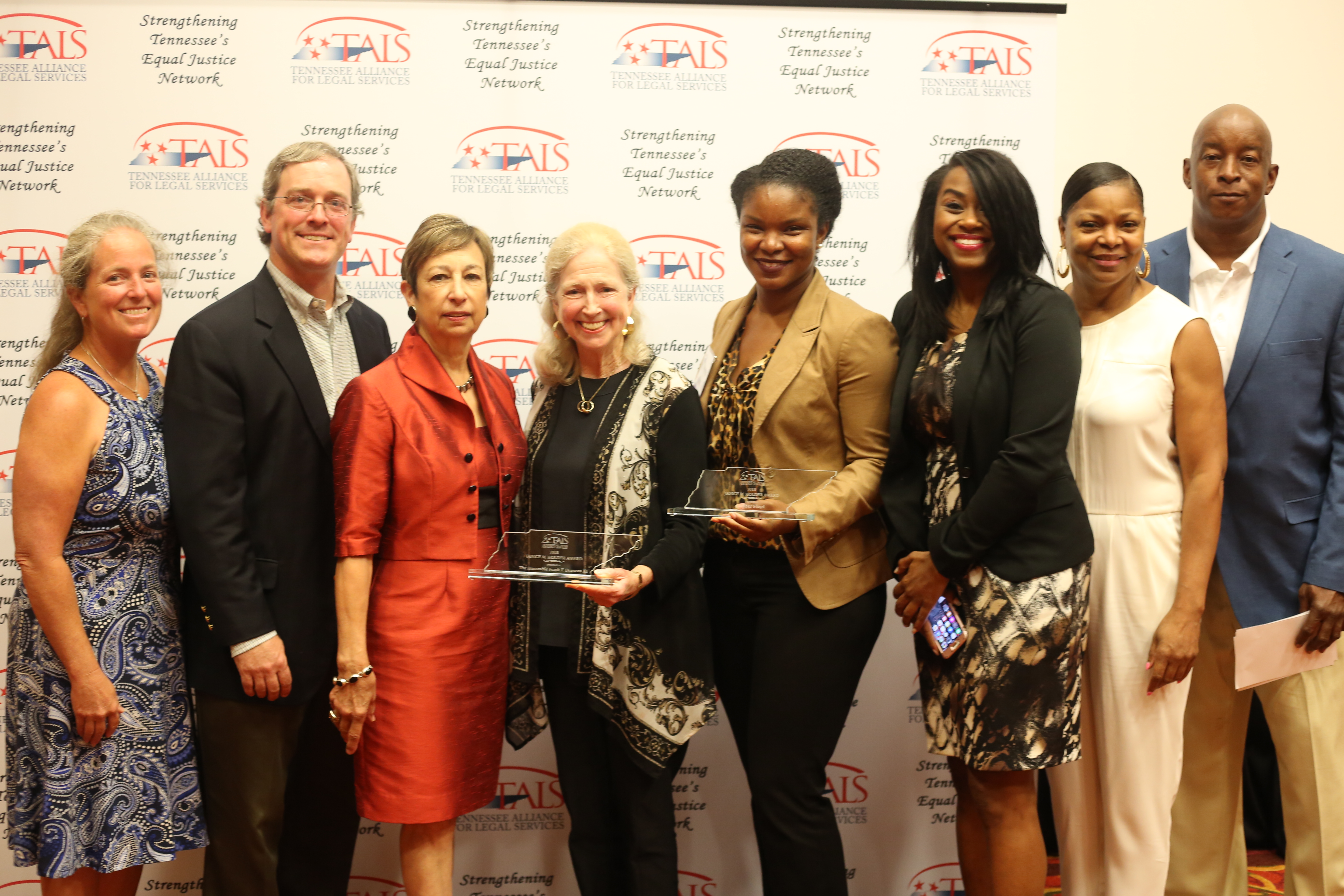Former Tennessee Supreme Court Justice Frank W. Drowota III and Memphis attorney Amber Floyd were announced as the winners of the 2018 Janice M. Holder Award at the Tennessee Alliance for Legal Services’s recent Equal Justice University event.
Since 2014, that award has been presented annually to individuals who have advanced the quality of justice statewide by ensuring that the legal system is open and available to all. The award is named after former Justice Janice M. Holder who, before her retirement in 2014, was instrumental in the Court’s establishment of its Access to Justice initiative, which seeks to expand civil legal representation to Tennesseans in need.
In her remarks, former Justice Holder explained why former Justice Drowota was so richly deserving of the award.
“Frank was all about access to justice before we ever began describing our efforts in those terms,” she said. “Before he retired in 2005, he urged his fellow justices to continue efforts to increase pro bono efforts across the state. He published op-ed pieces in the news media describing the legal needs gap. He promoted pro bono before it was cool and he supported legal aid organizations when it was not popular to do so.”
Former Justice Drowota, who was the second-longest serving justice in state history, passed away in April, so his wife Claire accepted the award on his behalf.
She said her husband would have been excited to see so many people gathered together in support of greater access to justice, even as his humble nature may have made him reluctant to receive accolades.
“We laughed and said this is the only way that Frank would ever accept an award,” Claire Drowota said.
Despite his low-key personality, former Justice Drowota was passionate about his work. A preacher’s son, he at one point considered following his father’s footsteps into the ministry, but decided that he had never really heard the call. Instead, he decided to make his judicial career a kind of ministry.
“He used that position of being a judge to serve as many people in as many ways as possible,” Claire Drowota said.
He also harbored a deep affection for his fellow judges and the judiciary as an institution, as Claire Drowota explained.
“He loved the judiciary second only to his family and his church,” she said. “He tried so much to create a sense of family in the judiciary, using that as a way to hopefully inspire all judges to have the work ethic and the impeccable integrity that the courts need.”
Former Justice Drowota’s children, Dr. Frank R. Drowota and Helen Drowota Close, were also in attendance as their mother accepted the award.
The second Janice M. Holder award of the day went to Amber Floyd, who is a commercial litigator with the firm of Wyatt Tarrant & Combs LLP in Memphis.
Floyd has led a number of efforts in recent years to ensure that vulnerable populations in the state receive the civil legal help that they need. These efforts notably include a series of expungement clinics. As Justice Holder mentioned, the first of these, held in Memphis, attracted over 1,000 visitors.
Furthermore, Floyd has served as the volunteer coordinator for the Music City Community Court Indigency Docket and Expungement Clinic and, in 2017, was appointed chair of the Memphis Bar Association’s Access to Justice Committee. In 2017, she was also named one of the year’s top 40 young lawyers by the American Bar Association.
“The list of accomplishments of this relatively new addition to the legal profession goes on,” Justice Holder said. “It is fitting that someone whose pro bono service is the heart of her work as a lawyer should share this award with a pioneer for whom such service was a ministry.”
Floyd encouraged all attorneys in the state, no matter their specialty, to join in the access to justice effort.
“There’s something that we all can do,” she said. “We all have a part to play.”
She also urged her fellow EJU attendees to spread the word about access to justice, so that even more progress could be made on the issue.
“What I would say to individuals in this room who are already involved in access to justice work and pro bono work is keep talking, keep telling people about what you’re doing,” she said. “Keep talking about the needs of individuals who are seeking services from your organization, and eventually somebody is going to listen. Because everybody wants to do something, they just don’t know what.”

